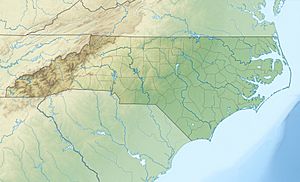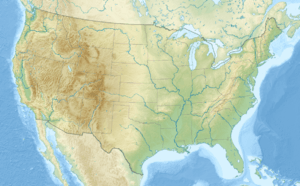Bush Creek (Cape Fear River tributary) facts for kids
Quick facts for kids Bush Creek |
|
|---|---|
|
Location of Bush Creek Creek mouth
|
|
| Other name(s) | Tributary to Cape Fear River |
| Country | United States |
| State | North Carolina |
| County | Lee |
| Physical characteristics | |
| Main source | Fall Creek divide about 4 miles northeast of Sanford, North Carolina 298 ft (91 m) 35°30′01″N 079°02′28″W / 35.50028°N 79.04111°W |
| River mouth | Cape Fear River about 1 mile southeast of Brickhaven, North Carolina 151 ft (46 m) 35°32′32″N 079°00′36″W / 35.54222°N 79.01000°W |
| Length | 4.00 mi (6.44 km) |
| Basin features | |
| Progression | generally northeast |
| River system | Cape Fear River |
| Basin size | 7.25 square miles (18.8 km2) |
| Tributaries |
|
| Bridges | none |
Bush Creek is a small stream in North Carolina. It's about 4 miles (6.44 km) long and flows into a much bigger river called the Cape Fear River. You can find Bush Creek in Lee County, North Carolina.
Contents
What is Bush Creek?
Bush Creek is a tributary, which means it's a smaller stream or river that flows into a larger one. For Bush Creek, that larger river is the Cape Fear River. It's located in Lee County, North Carolina, and plays a part in the local environment.
Where Does Bush Creek Start and End?
Bush Creek begins its journey about 4 miles (6.44 km) northeast of a town called Sanford, North Carolina. From there, it flows generally towards the northeast. Its journey ends when it joins the Cape Fear River. This meeting point is about 1 mile (1.6 km) southeast of Brickhaven, North Carolina.
How Big is the Area Bush Creek Drains?
The area that Bush Creek collects water from is called its watershed or drainage basin. For Bush Creek, this area covers about 7.25 square miles (18.8 square kilometers). This means all the rain and water that falls within this 7.25 square mile area will eventually flow into Bush Creek.
Rainfall and Forests
The Bush Creek watershed receives a good amount of rain each year, about 47.6 inches (121 cm). A large part of this area, about 60%, is covered by forests. These forests are important because they help keep the water clean and provide homes for many plants and animals.
 | Sharif Bey |
 | Hale Woodruff |
 | Richmond Barthé |
 | Purvis Young |



